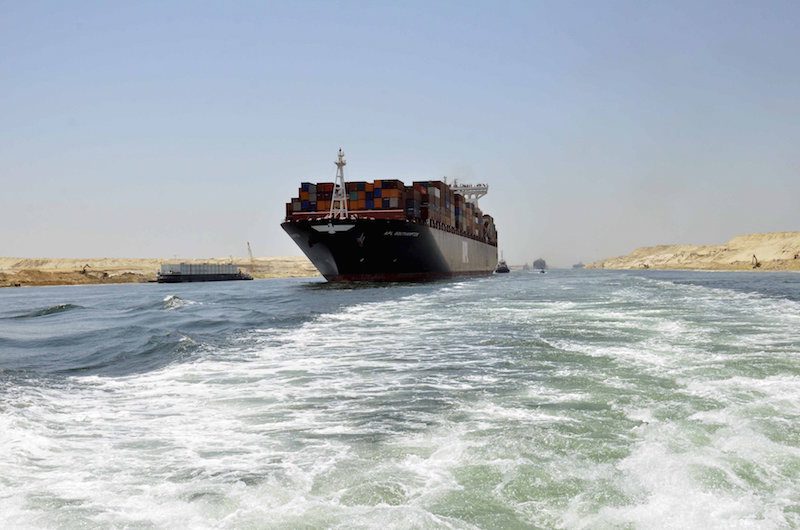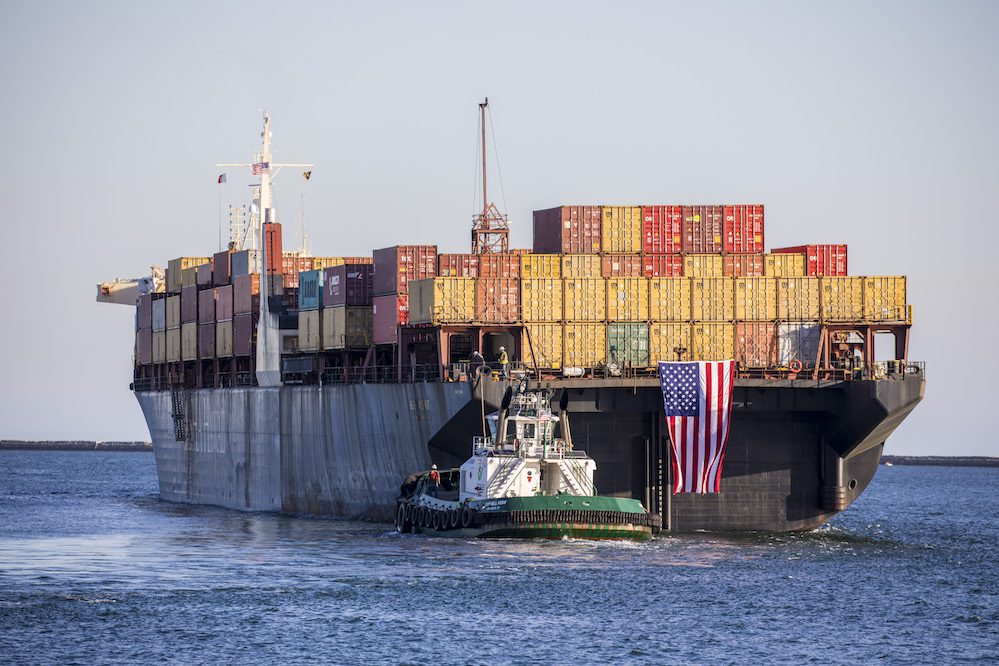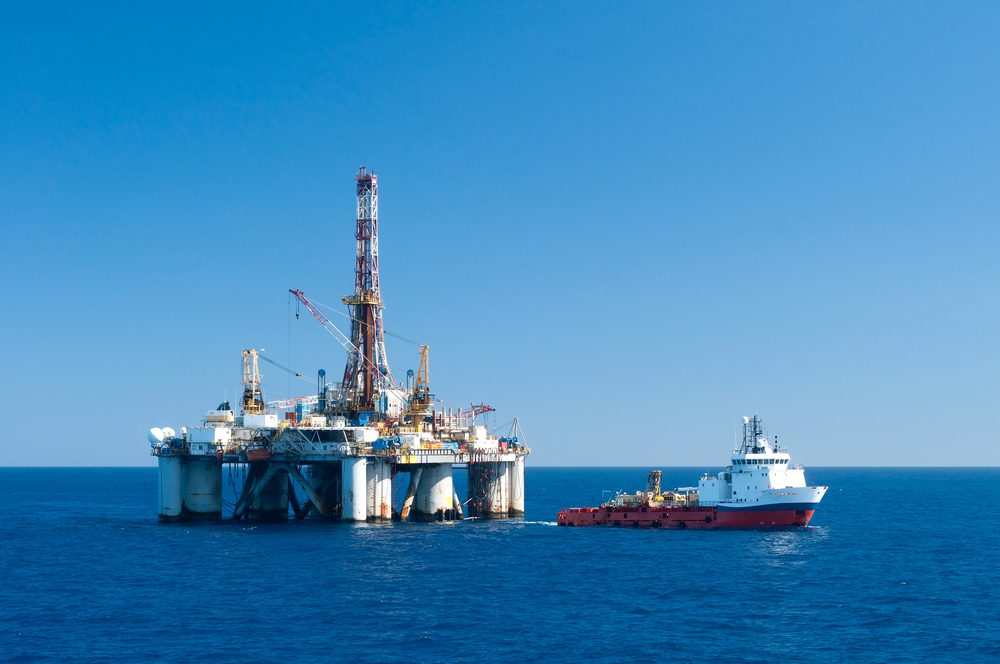A cargo ship is seen crossing through the New Suez Canal during a test run held July 25, 2015. Photo: REUTERS/Stringer
By Ahmed Feteha and Tarek El-Tablawy
(Bloomberg) — Egypt unveiled an $8.5 billion expansion to the Suez Canal on Thursday, the first of a series of mega projects the government has promised to undertake to transform the country after years of turmoil.
The expansion of the canal was a one-year venture overseen by the military under order from President Abdel-Fattah El-Sisi. The undertaking has been painted in nationalist tones, part of El-Sisi’s attempts, analysts say, to offer something tangible to a population weary of often violent unrest.
[contextly_sidebar id=”Ek5R1QSCDstBLlOrPebG0YIx4cl1diqB”]Officials have played up the canal expansion’s potential to redraw the “map of the world” just as the 146-year-old original did, even as the shipping industry has doubted its necessity. The hype is typical of Egypt’s government since El- Sisi, as army chief, led the overthrow of his Islamist predecessor, Mohamed Mursi, in 2013.
“Egypt is a great civilization with very few modern achievements,” said Samuel Tadros, a senior fellow at the Washington-based Hudson Institute. “El-Sisi understands this hunger among the Egyptian people for success in the world, and he’s giving it to them.”
The president, dressed in full military regalia, arrived at a lavish ceremony on board a yacht used by the last king to rule Egypt. Fighter jets buzzed the canal and the yacht was accompanied by a naval vessel.
“The new canal is just the first step of a thousand steps we have to take,” El-Sisi said in a televised speech as French President Francois Hollande and other dignitaries including Jordan’s King Abdullah looked on.
Gift to World
The expansion of Suez, a 193-kilometer (120-mile) link between the Red Sea and the Mediterranean, includes a new 35- kilometer channel and 37 kilometers of widening and deepening of the original. It allows two-way traffic and reduces transit time to 11 hours from 18, according to the operator. New ports and other facilities are also planned.
Cairo’s streets were adorned with billboards and flags praising El-Sisi and celebrating “Egypt’s gift to the world.” The state-run Al-Akhbar’s front page featured a picture of a prostrate El-Sisi with the headline: “Praise be to God.”
The new canal is a way “to show the world that while Egypt may have faced problems over the past few years, it is moving forward,” Shaimaa Ahmed, a 26-year-old mother of two, said in Cairo. “It’s something we can all take pride in — that it was built in a year and by Egyptians, and that it’s something the world can share.”
Locally Funded
Egyptian officials have pointed with pride to the project as one funded completely with local money. Egyptians snapped up 64 billion Egyptian pounds ($8.2 billion) of 5-year investment certificates issued to fund the project within days. Newspapers pointed out similarities with the 1956 nationalization of Suez, used by the government to finance the Aswan Dam after failing to secure foreign funding.
“Every few months the regime needs these sorts of celebrations to renew its bond with the people,” Tadros said. “In El-Sisi’s eyes, his legitimacy comes from these massive outbursts of Egyptians supporting him.”
Future projects promised include a new administrative capital east of Cairo, the reclamation of swaths of Egypt’s desert and the building of new urban centers.
Need Jobs
The celebratory mood isn’t shared by all Egyptians.
“I’m impressed that it was finished in a year, but I’d be happier if I could have found a job,” Nasser Sabet, 36, said, adding that he’s been looking for work that can help him support his family of five for the past year. “Instead of thinking of a new canal, they could have focused on finding ways to keep costs under control and creating jobs.”
Hundreds of supporters of the Muslim Brotherhood, which backed Mohamed Mursi’s rule, have been killed since El-Sisi was elected president last year, with thousands more imprisoned.
Egypt’s parliament has been shut for three years, leaving El-Sisi to function as a one-man legislature. Critics accuse his government of using excessive brutality to restore stability, while supporters say he spared Egypt from the kind of state collapse seen in other parts of the region.
State authority did break down following the popular uprising that ousted long-time ruler Hosni Mubarak from power in 2011. The security gap that followed scared away investors and tourists, causing the sharpest economic downturn in decades.
The construction projects have boosted the economy, which grew above 4 percent in the nine months to March for the first time since 2010. That recovery may be short-lived, with security concerns and a shortage of foreign currency weighing on growth, a survey of business activity showed on Tuesday.
El-Sisi is building public support around the mega projects as an alternative to real political participation, according to Ziad Akl, a senior researcher at the Cairo-based Al-Ahram Center for Political and Strategic Studies.
“The government is using the project as a tool for consolidating its legitimacy,” he said. “They’re sending a message that achievements are taking place.”
–With assistance from Salma El Wardany in Cairo.
©2015 Bloomberg News

 Join The Club
Join The Club











